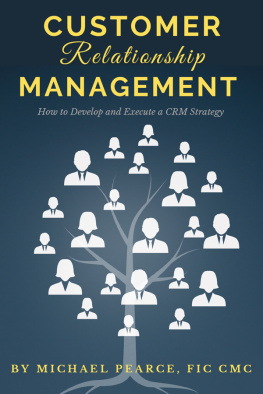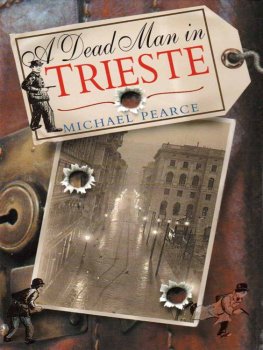Michael Pearce - The Bride Box
Here you can read online Michael Pearce - The Bride Box full text of the book (entire story) in english for free. Download pdf and epub, get meaning, cover and reviews about this ebook. year: 2013, publisher: Severn House, genre: Detective and thriller. Description of the work, (preface) as well as reviews are available. Best literature library LitArk.com created for fans of good reading and offers a wide selection of genres:
Romance novel
Science fiction
Adventure
Detective
Science
History
Home and family
Prose
Art
Politics
Computer
Non-fiction
Religion
Business
Children
Humor
Choose a favorite category and find really read worthwhile books. Enjoy immersion in the world of imagination, feel the emotions of the characters or learn something new for yourself, make an fascinating discovery.

- Book:The Bride Box
- Author:
- Publisher:Severn House
- Genre:
- Year:2013
- Rating:4 / 5
- Favourites:Add to favourites
- Your mark:
- 80
- 1
- 2
- 3
- 4
- 5
The Bride Box: summary, description and annotation
We offer to read an annotation, description, summary or preface (depends on what the author of the book "The Bride Box" wrote himself). If you haven't found the necessary information about the book — write in the comments, we will try to find it.
The Bride Box — read online for free the complete book (whole text) full work
Below is the text of the book, divided by pages. System saving the place of the last page read, allows you to conveniently read the book "The Bride Box" online for free, without having to search again every time where you left off. Put a bookmark, and you can go to the page where you finished reading at any time.
Font size:
Interval:
Bookmark:
Michael Pearce
The Bride Box
ONE
Gareth Cadwallader Owen, The Mamur Zapt, Head of the Khedives Secret Police, was sitting in his office, the blinds drawn against the sun, grappling with the latest misdeeds of the Brotherhood, when Nikos, his official clerk, came in looking pale.
Effendi
Yes?
Miss Skiff to see you.
Miss Skiff was the elderly and eccentric English lady who ran the Cairo Dispensary for Sick Animals.
Owens responsibilities, although wide, did not in his view extend to sick animals. He turned back to the Brotherhood. You sort it, he said.
After a while he became aware that Nikos was still standing there. Well?
She has a girl with her.
So?
A little girl, said Nikos with emphasis.
Owen thought he understood. Nikos was not a family man. Owen sometimes suspected that his most intimate relationships were with the steel filing cabinets that filled his office. People, he was not good at; children, he could not make out at all. They filled him with alarm. He sometimes saw them from his window. They milled about in an unruly and unpredictable way. How did you deal with them? How, so to speak, did you come at them?
Oh, very well, said Owen, and got up from his desk. He went through into Nikoss office. Miss Skiff was sitting there with a little Egyptian girl, holding her by the hand.
Captain Owen
Fraser, an engineer on the Egyptian railways, had been going along the carriages of the train that had just come in from Luxor, checking the bearings for sand, when something had stirred in the darkness at the end of the carriage he was under. He crawled up to it and was surprised to find that it was a little girl squashed up in the space above the wheels. When he had hauled her out she had put up her hand to shield her eyes against the sudden brightness of the sun. And then the whole front of her face had fallen off.
It gave me quite a turn, he confessed afterwards at the bar.
Unnecessarily, it turned out, since what had come off was not in fact the front of her face but a dense layer of flies which had settled on a raw wound that they were concealing.
Still, that was bad enough and he felt that something ought to be done about it. But what?
I mean, I had the rest of the train to examine, he explained to his cronies at the bar.
So what did you do?
Well, I thought at first of taking her to the hospital, but the Victoria is a long way from the Pont Limoun and, as I say, I had the rest of the train to do. But then I hit upon the answer. Miss Skiffs outfit is just up the road.
But thats for animals!
But she would know about wounds, wouldnt she? Anyway, I took the little girl along. Ill admit she was a bit surprised but she took her in. And I finished the train and went home for supper. Actually, I was a bit worried about it afterwards. I mean, you ought to report these things, oughtnt you? But to whom?
The police?
I suggested that to Miss Skiff, but she wasnt having any of it. Apparently, she had not got on too well with the police over some of her stray animals. And she had been talking to the girl, and said that was not the right thing to do. This is a case for the Mamur Zapt, she said.
The Mamur Zapt was a traditional post in the Egyptian government. Indeed, some claimed that he was the Khedives right-hand man. Less traditionally, but like many of the other senior posts in the government, it was occupied today, in 1913, not by an Egyptian but by an Englishman. A few years before, the British had been invited to sort out Egypts chaotic finances and, well, they had stayed. The effective ruler of Egypt was not the Khedive, nor his unfortunate Prime Minister, but the British High Commissioner who, in the interests of better administration so he said had installed his own British men in most of the countrys senior posts. Including that of Mamur Zapt.
The present occupier of the post was not, actually, as he frequently but fruitlessly pointed out, an Englishman but a Welshman, which put him at a certain distance from both sides. He was loyal, or, as some claimed, disloyal to both sides. Anyway, in the High Commissioners view but not the Khedives this made for greater efficiency. In Owens view it merely meant that he could be stabbed in the back by both sides.
Hello! said Owen. Whats your name?
The little girl was tongue-tied.
Mine is Gareth, he said easily. Its a funny name, I know, but thats because its foreign. I come from England This was stretching a point, because he was Welsh and proud of it. Where do you come from?
As she remained silent, he said, Lets see if I can guess: is it Luxor?
The little girl shook her head.
Assiut? No?
He tried several other places.
Youve got me beat, he said at last.
The little girl gave a triumphant smile. Denderah, she whispered softly.
Really? Well, thats a long way away! And you came all that way on the train? It cant have been very comfortable, under the train like that. Nikos had showed him a briefing note as he came in. Was it dusty?
The little girl nodded.
At least this man spoke in a language she could understand. Fraser had been totally incomprehensible to her.
And the sand blew up, too, I expect. Did it get in your eyes?
She nodded again.
And in your mouth, Ill bet. Did you try to spit it out?
He gave a mock spit. The little girl gazed at him, amazed.
Then, tentatively, she followed suit.
Owen gave a yet bigger spit.
The little girls face, so far as he could see it behind Miss Skiffs bandaging, broke into a delighted smile and she gave a huge spit.
They rivalled each other for a moment or two before Nikoss horrified eyes.
Captain Owen Miss Skiff began.
Ill bet youre thirsty after all that! Would you like a drink?
On Nikoss desk, as in all offices in Cairo, was a pitcher of water. It was covered with a cloth, not just to keep out the sand, which came in through the shutters and lay in a thin film upon every surface, but to keep the water cool. A suffragi came in regularly and dipped the cloth in a bowl of ice and water and then wrapped it round the pitcher again.
Owen poured out a glass and gave it to the little girl.
What did you say your name was?
Leila, she said softly.
Gradually he teased her story out of her. Her mother had died giving birth to a little brother, who also had not lasted long. Her father had taken another wife and this time the wife was not so nice. For a time a bigger sister had protected her but then the sister had gone away. Then one day a white man had come and she had been told to go away with him.
White man? said Owen.
Yes. But he wasnt very nice. And there were other men, too, some with whips. And a lot of children like her. And they all started walking. And one of the men had said they were going to the sea and would get on a boat. But Leila had not wanted to go on a boat and had run away.
And now Owen understood why Miss Skiff had been so adamant that the little girl should be taken to the Mamur Zapt to tell her story.
I thought the slave trade had been stamped out, said Owens friend Paul at the Sporting Club that evening. Paul was an ADC to the High Commissioner and Owen often found it useful to run things past him before they got out into the open and too many people had a hand in them.
If it had been the Sudan, I would have understood it, said Owen.
Dont let them hear you saying things like that, said Paul. They think theyve stamped it out, too.
The Sudan, that vast country, larger than India, which lay to the south of Egypt, was jointly governed by Egypt and Britain. There, too, there was a difference between appearance and reality. While formally the Sudan was a condominium, jointly governed by Egypt and Britain, in practice the British ran the show. Once their troops had re-conquered the Sudan in the name of Egypt some years before, the British had stayed there, too. It was Englishmen not Egyptians who were the District Commissioners and the country was governed from Khartoum. There, too, the slave trade had been put down supposedly. It was one of the pretexts for the British invasion.
Font size:
Interval:
Bookmark:
Similar books «The Bride Box»
Look at similar books to The Bride Box. We have selected literature similar in name and meaning in the hope of providing readers with more options to find new, interesting, not yet read works.
Discussion, reviews of the book The Bride Box and just readers' own opinions. Leave your comments, write what you think about the work, its meaning or the main characters. Specify what exactly you liked and what you didn't like, and why you think so.


